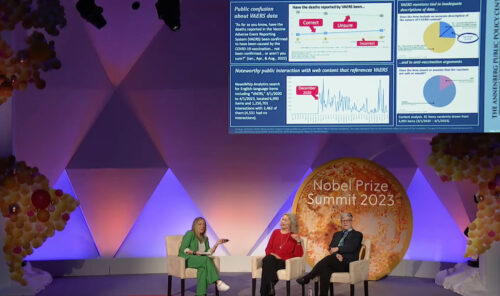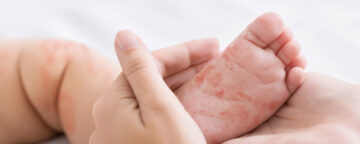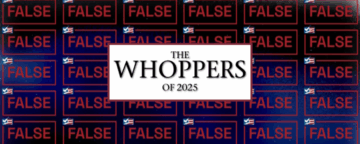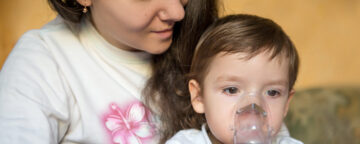The National Academy of Sciences, in partnership with the Nobel Foundation, hosted the second Nobel Prize Summit in Washington, D.C., on May 24-26, 2023, assembling Nobel laureates, leading scientists, business leaders, writers, artists, and young innovators “to share insights, challenges, and solutions around trust and information.”
In a session titled “Trust in Truth, Facts, and Scientific Evidence,” Annenberg Public Policy Center director Kathleen Hall Jamieson and Stockholm University professor Åsa Wikforss discussed communicating science in a post-truth world. Jamieson, the 2020 recipient of the National Academy of Sciences’ Public Welfare Medal, is also a professor of communication at the Annenberg School for Communication at the University of Pennsylvania, and Wikforss is a professor of theoretical philosophy as well as a member of the Swedish Academy. While on stage, the two scholars were asked a critical question: “Are there specific ways to reduce public susceptibility to misinformation about science?”
In response to this question, Jamieson introduced a just-released APPC white paper advocating for renaming the Vaccine Adverse Event Reporting System (VAERS). VAERS is a national vaccine safety monitor jointly managed by the Centers for Disease Control and Prevention (CDC) and the Food and Drug Administration (FDA) to provide both healthcare providers and the public with a centralized platform to report symptoms and individual experiences after they receive a vaccine. Even though VAERS is meant to be a reporting – not verification – system, the name “vaccine adverse events” may connote a causal relationship between the vaccines and the reported symptoms. However, as the CDC notes, these “adverse events” are often unrelated to the vaccines and, in Jamieson’s words, provide “at best, correlational” evidence of a link with the vaccine. A system to track events of possible concern becomes a system that inadvertently communicates that thousands of concerning events are being caused by vaccination.
Jamieson also warned at the Nobel Prize Summit that those who understand the limitations of VAERS often fail to communicate their existence when discussing the system. As she explained, when individuals talk about VAERS, they are unlikely to point to the “raw and unconfirmed” nature of the reported symptoms, resulting in the accidental spread of misinformation from the very sources trying to quell it. To resolve that issue, she proposes renaming VAERS as the Vaccine Safety Watch: Incident Reporting System.

The presentation by Jamieson and Wilkforss on “Communicating Science in a Post-Truth World” is discussed in the National Academy of Sciences’ book “2023 Nobel Prize Summit: Truth, Trust, and Hope: Proceedings of a Summit.” Read it here on the National Academies site.


